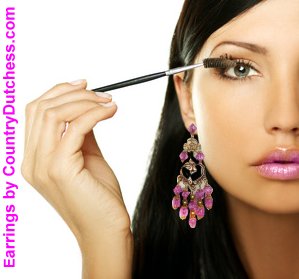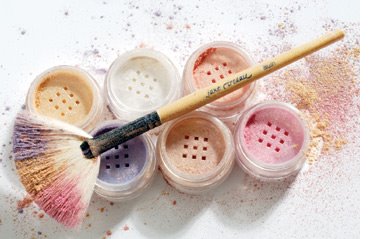
I gave my word to the many readers I heard from following my story on the dangers linked to the Gardasil cervical vaccine ( now being considered for approval for use in older women ) - that I would stay on top of this story.
With this in mind, I'm happy to report the FDA has taken steps towards better protection of women by issuing a stern warning letter to Merck, the makers of Gardasil, for deficiencies found in their West Point, Pennsylvania manufacturing plant.
Among the issues cited by the FDA included the fact that Merck failed to establish adequate written procedures describing the handling of all written and oral complaints about a drug product - including the complaints filed about Gardasil.
Also included in the warning letter was mention of " significant deviations from current good manufacturing practice ... in the manufacture of licensed biological vaccine products, bulk drug substances, and drug components" .
If you, a daughter, a sister, a friend ....or any woman you know has suffered ill effects following vaccination with Gardasil , make a report to your doctor and log on to the FDA's adverse events drug reporting page and make your voice heard!
Read the full story on the FDA letter in today's Wall Street Journal.
Wednesday, April 30, 2008
Follow Up- Cervical Vaccine Warnings
Tuesday, April 29, 2008
Considering HRT: Consider This...

If you're considering using hormones to quell the symptoms of menopause, there's important news to consider.
Research just published in the Archives of Internal Medicine has shown that women who take HRT - hormone replacement therapy - are at increased risk for stroke, up to 62% for those taking the highest doses.
But don't panic. There's more to this story than just statistics.
The research, which analyzed health records from over 120,000 women found that HRT does indeed increase the risk of blood clots - and that increases the risk of stroke.
However, they also found that the risks do appear to dose -related. Women who took the highest doses of hormones had the greatest risks, while those who took the lowest doses had only a marginal increased risk of stroke.
Why is this important?
At least some of the data used in this study was collected from women taking hormones as early as 1974 - a time when much higher doses of both estrogen and progesterone were routinely prescribed.
Today, the levels used in most HRT formulations are much, much lower - and most doctors, as well as experts from the North American Menopause Society as well as the American College of Obstetricians and Gynecologists now recommend using the lowest possible dose to control symptoms.
So, this same study conducted on women today might not yield these same statistical results.
That said, if you have other risk factors for stroke - including high blood pressure, and particularly if you smoke, or, if you have experienced pre eclampsia or high blood pressure during pregnancy ( even if it's normal now) HRT, in any dose, may still hold significant risks for you. Risks may also be signfiicant if you have a family history of stroke or related cardiovascular diseases.
The key: Talk to your doctor. Make sure your physician knows not only your complete health history - including conditions that may have existed at another time in your life - as well as your family history of disease - before discussing whether or not HRT is right for you.

Tuesday, April 22, 2008
Anti Aging Make Up Tips - The Real Deal
Geeze, listening to these babes one would think that the day after your 45th birthday you dump every piece of make up you own just to make room in your bathroom vanity for gallon jugs of Metamucil and cartons of incontinence pads! Oy. All I can say is ....they'll learn. :)
But in the meantime, here's the real deal: Yes, your make up does have to change once you hit your 40's - but no, you don't have to give up your favorite looks or products. You just have to modify the way in which you use them.
To help you do that, here's a few Do's and Don'ts Red Dress Diary STYLE - when they say you can't I say of course you can!
They say: Once you're over 45 don't put dark shadow in the crease of your eye.
Red Dress Diary Says: Nonsense. You can still use this eye defining trick - the catch is to feather the darker shadow up towards the brow line and then add just a tiny touch of highlighter in the arch, on the bone. As long as you don't load up on highlighter from the crease to the brow bone ( that would give your eyes a droopy, aging look) you can still use this technique to bring out your beautiful eyes.
They say : To look younger you must use a reflective eye lightening product .
Red Dress Diary Says: Gimme a break! Once you hit 40 you begin to develop that deepening crease running from the side of your nose towards the under eye ( doctors call this the "tear trough"). If you put a light reflecting product in this area, it's going to make the area above the crease look puffy (light brings it all forward) ,which in turn is going to make the crease look deeper and darker. Instead, apply a matte concealer in one to two shades darker than your foundation. Yes - darker! This will reduce the look of puffiness, and cause the "tear trough" to recede and disappear.
They say : To look younger wear pink lipstick.
Red Dress Diary Says: Sure, if you're going for that Tinkerbell on HRT look. To look younger 40+ lips need to look naturally fuller - not gooked up in pink. Try this instead: Use a nude color lip pencil and a light hand to color in lips completely. ( I don't want to see any of those Adriene Arpel 1968 dark outlines!) Top with a sheer gloss or one that's lightly tinted in coral or brown. You will not believe how young your whole face looks!
For more fun and easy anti aging skin care tips CLICK HERE.
Wednesday, April 16, 2008
You Won't Believe What Exercise Can Do For You!
BOTOX: Study Reports New Concerns
 http://www.countrydutchess.com/
http://www.countrydutchess.com/Friday, April 4, 2008
WARNING: Good Books In Danger of Extinction
 An article appeared in today's NY Times Business section detailing a plan by Harper Collins publishing to do away with author advances - money that is paid to a writer to basically, write a book. Now you might think that this doesn't apply to you, or your life - but hear me out … because it really does.
An article appeared in today's NY Times Business section detailing a plan by Harper Collins publishing to do away with author advances - money that is paid to a writer to basically, write a book. Now you might think that this doesn't apply to you, or your life - but hear me out … because it really does.
Just as a matter of background, a book advance is money given to the author to help pay for living expenses while they write the book. It also helps to pay for some promotion of the book so that readers like you know that it exists - something that publishers used to pay for and don't anymore.
And unless you're Bill Clinton or the Pope a book advance is usually a very modest sum. But it does allow the writer to take some time out of their regular work life to produce a quality product - something that is well researched and well vetted as well as creative and well written.
And it's not like an author advance is a gift or anything. Because once a book is published, authors don't see one dime of what you, the reader, pays for each copy, until the publisher makes back that 'author advance' - and all their other expenses. Only when that happens does the author have a chance of receiving a very small percentage (sometimes as low as 5%) of what the book earns over time.
Now, according to the NY Times piece, Harper Collins seeks to do away with the author advance completely, replacing it with a percentage of the book's profits only after it starts to sell. Citing rising publishing costs and increasing returns from bookstores, these geniuses have decided this is one way to "save the book business" from extinction. It also means authors now work for zero money.
Here's why this is SUCH a BAD IDEA- and how it can impact the quality of every book you read.
1. Because authors will now have to maintain their day job in order to survive while writing this book, there's no question the book is going to take a lot longer to write. For those of us who write timely non-fiction works, that means that what you read will be old news by the time it gets to your local book store, let alone gets into your hands.
2. Because authors will now be restricted to writing on lunch hours, on the subway, bus or train, or at night when we are dead tired, there is no question the quality of the books that are produced in a timely manner will suffer. And yes, I know the legend of the old "kitchen table book" written by the housewife in between potty training and PTA. But trust me, those books are few and far between and usually take a decade to write.
3. That leaves the possibility open for a third option: All books will eventually be written only by the excessively wealthy. So that means yet more know-it-all obnoxious celeb tomes, more books by corporate big wigs out of touch with the real world and God help us, more asinine heiress memoirs. Without an advance, these will be the only people who can afford to write a book!
What does all of this mean to you? Fewer books that relate to your life and lifestyle, fewer books written by quality writers, fewer quality books to choose from overall.
A Better Solution
I do, however, see one possibly better solution - and that is if we begin today to support self publishing. If publishers will no longer pay for book promotion, and now, are no longer going to grant author advances, I say what the heck do we need them for? We can write our own books, self publish them, sell them online - and keep all the profits - which will then, as authors, help support us while we write the next quality, self-published book.
This is even more true for the experienced authors that Harper Collins hopes to attract with their "no money down" deal.
How can you - as a reader - make a difference? It's easy.
The next time you see a book that's NOT published by a major company like Harper Collins or Random House, pick it up and give it some attention anyway.
Or better still, Google your favorite topics and visit the websites of authors who have already self published, and view their offerings with an open mind. You might just discover a book, or even an author, that is far better than what the major publishers are telling you to read.
And oh yeah...I sincerely hope that some of my colleagues in the Book Review business are listening. They can help by including an "Indy" review in their work on a regular basis.
Because from where I stand, self publishing - and not greedy publishers - may be what saves the book business after all.
New Dangers: Anti Aging Creams, Sunscreens, LipGloss
 There's no question that regular use of sunscreen will reduce your risk of skin cancer. And there's good evidence that at least some anti aging creams will help your skin look younger.
There's no question that regular use of sunscreen will reduce your risk of skin cancer. And there's good evidence that at least some anti aging creams will help your skin look younger.
But now disturbing new evidence is mounting that one ingredient commonly use in both – the chemical oxybenzone – may, in and of itself be a health risk – not to mention prematurely aging your skin.
At the heart of the matter: Evidence that oxybenzone penetrates the skin, and when it does it increases the production of free radicals – byproducts of cellular activity that can cause cell changes linked to cancer. Indeed, one of the links between sun exposure and skin cancer is an increased production of free radicals. Free radicals are also one of the leading causes of premature aging of the skin.
In Europe, concerns brought to light by a number of studies led to a labeling law requiring products containing more than 5% oxybenzone must be labeled as such.
There are no such labeling requirements in the United States.
According to the Environmental Working Group there some 588 sunscreen products alone available in the United States containing oxybenzone including popular brands such as Hawaiian Tropical, Coopertone and Banana Boat. Many anti aging creams, as well as lip glosses and balms, as well as some facial moisturizers also contain this chemical.
Certainly it's not a good idea to stop using sunscreen - and please don't take away my antiaging creams! But do read labels and look for those products which contain minimal or no oxybenzone. In terms of lip glosses and moisturizers, it's easy to avoid this ingredient altogether.
Bon Appétit! Some Really Good Food News!

What could be better than eating something scrumptious – and finding out it's good for you too!
Well, nothing could be better…which is why I'm excited to report on some of the hottest, newest, ground breaking research, all of it linking good food to great health!
Here's what's causing the buzz right now!
GREEN TEA – AND ANTIBIOTIC - The next time your doctor prescribes an antibiotic you might want to wash it down with some green tea. The reason: New research presented this past weekend at the Society for General Microbiology's 162nd meeting in Edinburgh, Scotland showed how green tea can dramatically boost the effectiveness of many antibiotics. In fact, in certain cases it may even help some drugs combat strains of bacteria that are normally resistant to treatment. The study, conducted by a group of Egyptian doctors is particularly exciting because it may mean that green tea can reduce the amount of antibiotic needed to be effective against various organisms. Fewer drugs mean lower costs and less antibiotic resistance! The 12-month study is expected to be published in an upcoming edition of the European Journal of Clinical Microbiology and Infectious Diseases.
VITAMIN A & TYPE 1 DIABETES- Do you have a family history of diabetes – or are other health problems increasing your risk? If so you might want to start chowing down on peaches, cantaloupe, spinach and other foods rich in vitamin A. A new study just published in the Journal of Nutrition found high intakes of Vitamin A appears to stymie the onset of type 1 diabetes by helping to keep the body from attacking its own insulin producing beta cells. The study, conducted on mice that were treated to foster the development of diabetes, revealed that just 25% of the rodents fed high levels of vitamin A developed diabetes, compared to 71% who didn't get the vitamin. The researchers believe that dietary intervention may help control or even prevent type 1 diabetes from developing in some people.






































